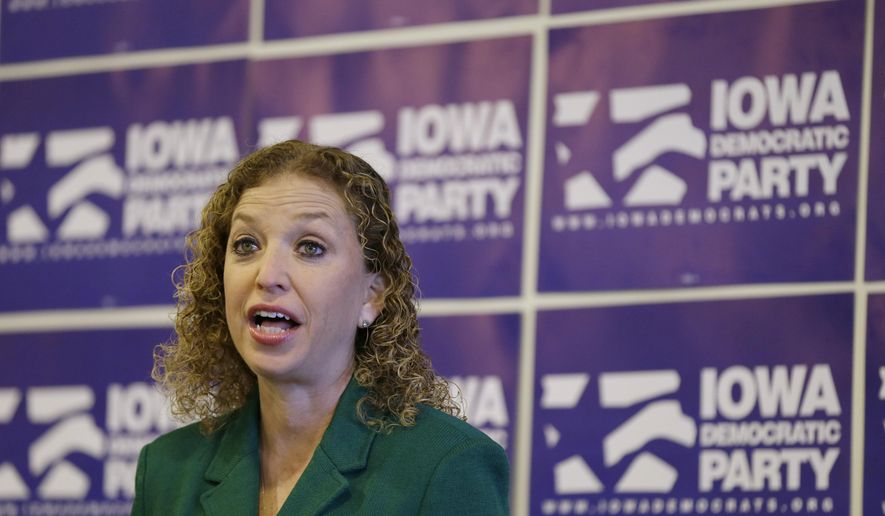Democratic National Committee chair Debbie Wasserman Schultz’s own party leaders have accused her of being “undemocratic” and rigging the presidential primary debate schedule to help Hillary Rodham Clinton, but she is standing firm on her decision to strictly limit the number of presidential debates.
The rift between Mrs. Wasserman Schultz and the state party leaders who make up the committee, as well as with Democratic presidential candidates, made for an uncomfortable DNC summer meeting at the weekend.
During the event at the Hilton Minneapolis, Mrs. Wasserman Schultz was confronted privately and publicly but refused to reconsider her decision to allow only six debates.
“My staff and I made this decision and we are not going to change it. No matter what we decided, there would be individuals who would be unhappy,” Mrs. Wasserman Schultz said when confronted privately at the hotel by New Hampshire state Sen. Martha Fuller Clark, vice chair of the New Hampshire Democratic Party.
“I knew there were people who would be unhappy and I’m not going to change the schedule,” said Mrs. Wasserman Schultz.
Mrs. Clark recounted the exchange, describing it as an “intense conversation.”
SEE ALSO: Bernard Sanders, presidential candidate, closes gap with Hillary Clinton in Iowa
“She’s been pretty immovable with regard to the number of debates,” said Mrs. Clark, who said the lack of TV debates was a disservice to voters in the nation’s first primary in New Hampshire.
The New Hampshire party is planning a series of forums and other events to showcase candidates as an alternative to debates, but she said it would not be the same as having the candidates face off on TV.
The official schedule created by Mrs. Wasserman Schultz sanctioned six debates, with the first one postponed until October. She also has threatened that any candidate or media outlet that participates in debates outside the official schedule will be banned from the remainder of the party sanctioned debates in 2016.
Under the DNC schedule, the first four debates will occur one per month in early-voting states: Nevada in October, Iowa in November, New Hampshire in December and South Carolina in January, followed by a debate in Miami and one in Wisconsin with dates in February or March to be announced later.
The feud within the DNC over the debates spilled into the open at the convention Friday, when presidential candidate and former Maryland Gov. Martin O’Malley used his speech to the convention to publicly rebuke Mrs. Wasserman Schultz’s actions.
Mr. O’Malley said that DNC leaders had not only silenced debate among Democratic candidates but silenced the party’s ability to respond to Republican presidential candidates, whose recent TV debate reached more than 20 million Americans.
“They malign our president’s record of achievement, they denigrate women, and immigrant families. They doubled down on trickle down, and they tell their false stories,” he said. “And, we respond — with crickets, tumbleweeds, a cynical move to delay and limit our own party debates.”
Mr. O’Malley’s criticism of his party officials was greeted with applause and cheers from the crowd of state party chairs in the ballroom of the Hilton Minneapolis.
“Four debates. Four debates?” Mr. O’Malley asked with incredulity. “This is totally unprecedented in our party history. This sort of rigged process this has never been attempted before.”
He continued: “Who’s decree is this exactly? Where did it come from? To what end? For what purpose? What national or party interest does this decree serve?
Sen. Bernard Sanders, Vermont independent and Mrs. Clinton’s chief current rival for the Democratic presidential nomination, said Sunday that Mrs. Wasserman Schultz’s decision was “dead wrong.”
“I think that that is dead wrong and I have let the leadership of the Democrats know that,” he said on CNN’s “State of the Union.” “I think this country benefits, all people benefits, democracy benefits when we have debates and I want to see more of them.”
In Minneapolis, as the DNC meeting was about to adjourn Friday, a state party official interrupted the proceeding to offer a motion that the DNC members vote on increasing the number of debates.
Cecil Benjamin, state chair of the Democratic Party of the U.S. Virgin Islands, offered a motion, igniting a burst of cheers and applause from the ballroom.
His attempt to put the chair’s debate edict to a vote was quickly derailed by a ruling by Mrs. Wasserman Schultz that his motion was out of order.
• S.A. Miller can be reached at smiller@washingtontimes.com.




Please read our comment policy before commenting.